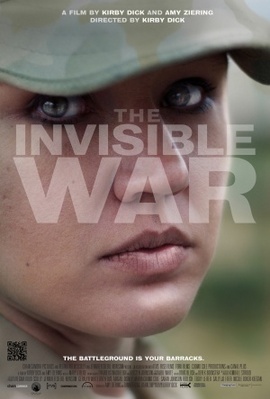
The Invisible War is a 2012 documentary written and directed by Kirby Dick.
It examines rape and sexual assault in the U.S. military. A series of rape victims, mostly women but some men, are interviewed on camera, testifying in graphic detail about how they were attacked. Rape culture in the military is suggested to be rooted in a self-selection of aggressive masculine types for the armed forces, and exacerbated by the closed-off nature of military society. As the film also reveals, a mindset of cover-up and denial is endemic. Investigating officers, usually the commanders of the units in question, seek above all else to end investigations. Charges are rarely filed, rapists are let off with minimal punishments on the rare occasion that they're convicted, and victims who report their rapes suffer major consequences to their careers.
Tropes:
- Documentary: Of sexual assault in the military and the indifference of higher-ups to it.
- For Inconvenience, Press "1": One montage shows the extraordinary wait that Kori Cioca undergoes on multiple occasions as she tries to get an answer on her VA claim.
- Kangaroo Court: Rape investigations in the U.S. military. Victim after victim after victim talks about having an attack swept under the rug by unit commanders who simply don't believe them. More than one victim mentions how they were charged with adultery (a crime in military law) when they weren't married but their rapists were.
- Karma Houdini: All the rapists described in this film. One was promoted to lieutenant colonel.
- The Ken Burns Effect: Used extensively with photos. There is a slow zoom in on a photo of Kori Cioca as she describes how the man who eventually raped her had a previous habit of intruding in her room and lying on her bunk when he was drunk.
- Stock Footage: Most of the movie outside of the Talking Heads. The opening montage is a series of newsreels and training videos aimed at women, some of which are jaw-droppingly sexist.
- Talking Heads: Many interviewees. Kori Cioca, a Coast Guard veteran who was left with a severely damaged jaw after her rapist punched her in the face, gets the most screen time.
- "Where Are They Now?" Epilogue: Pictures of the main interviewees play at the end as the film tells what they went on to do after leaving the military. The montage also notes how none of their rapists suffered punishment.
